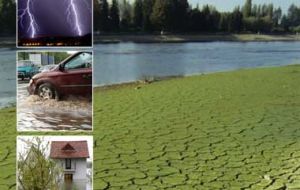MercoPress. South Atlantic News Agency
Climate Change Meeting Opens In Thailand
 Climate change: 'The time to act is now'
Climate change: 'The time to act is now' Delegates at a major climate meeting debated Monday how to rein in rising greenhouse gas emissions that could threaten hundreds of millions with hunger and disease in the coming decades.
For the rest of the week, hundreds of scientists and diplomats attending the Intergovernmental Panel on Climate Change meeting will work to finalize a report detailing a range of technological options to mitigate rising levels of carbon dioxide, methane and other heat-trapping gases. "The time to act is now," Chartree Chueyprasit, a deputy secretary in Thailand's Ministry of Natural Resources and Environment, told delegates. The draft report, which will be amended following comments from dozens of governments, says emissions can be cut below current levels if the world shifts away from carbon-heavy fuels such as coal, invests in energy efficiency and reforms the agriculture sector. "The science certainly provides a lot of compelling reasons for action," said Rajendra Pachauri, chairman of the climate change panel. "But what action and when is what the government will have to decide." Two previous IPCC reports this year painted a dire picture of a future in which unabated greenhouse gas emissions could drive global temperatures up as much as 11 degrees Fahrenheit by 2100. Even a 2-degree-Celsius (3.6-degree-Fahrenheit) rise could subject up to 2 billion people to water shortages by 2050 and threaten extinction for 20 percent to 30 percent of the world's species, the IPCC said. Scientists have said that global warming could increase the number of hungry in the world in 2080 by between 140 million and 1 billion by contributing to widespread droughts and flooding. Diseases such as malaria, diarrhea and dengue fever could spread as temperatures rise and weather becomes increasing erratic, affecting the poorest of the world's poor. The third report stresses that the world must quickly embrace a basket of technological options _ already available and being developed _ just to keep the temperature rise to 2 degrees Celsius (3.6 degrees Fahrenheit). Making buildings more energy-efficient, especially in the developing world, through better insulation, lighting and other steps, also could lead to significant cuts as would converting from coal to natural gas, nuclear power and renewable energy such as wind. Less significant but also important would be steps to make motor vehicles more fuel-efficient, reduce deforestation, and plant more trees as a carbon "sink," absorbing carbon dioxide. Even capturing methane emitted by livestock and its manure would help, the draft report says. Over the next century, it says, such technology as hydrogen-powered fuel cells, advanced hybrid and electric vehicles with better batteries, and carbon sequestration _ whereby carbon emissions are stored underground _ will become more commercially feasible. "The most important thing is to improve energy efficiency," said Jean-Pascal van Ypersele, a member of the Belgian delegation on the sidelines of the conference. "There is a lot of energy wasted everywhere in the world," he said. "In the long term we won't have fossil fuels anymore. We have to improve the way we use renewable energy."




Top Comments
Disclaimer & comment rulesCommenting for this story is now closed.
If you have a Facebook account, become a fan and comment on our Facebook Page!